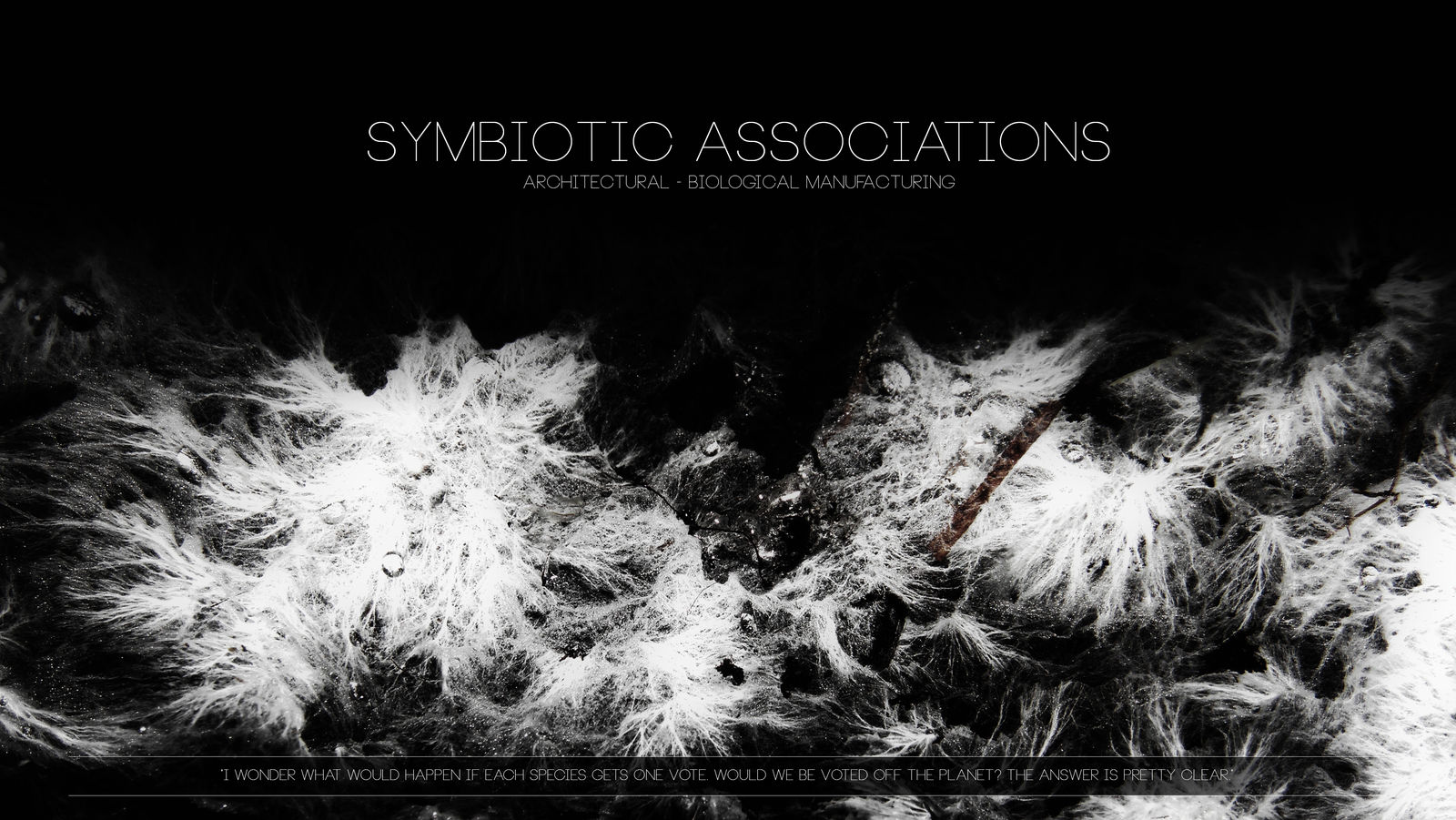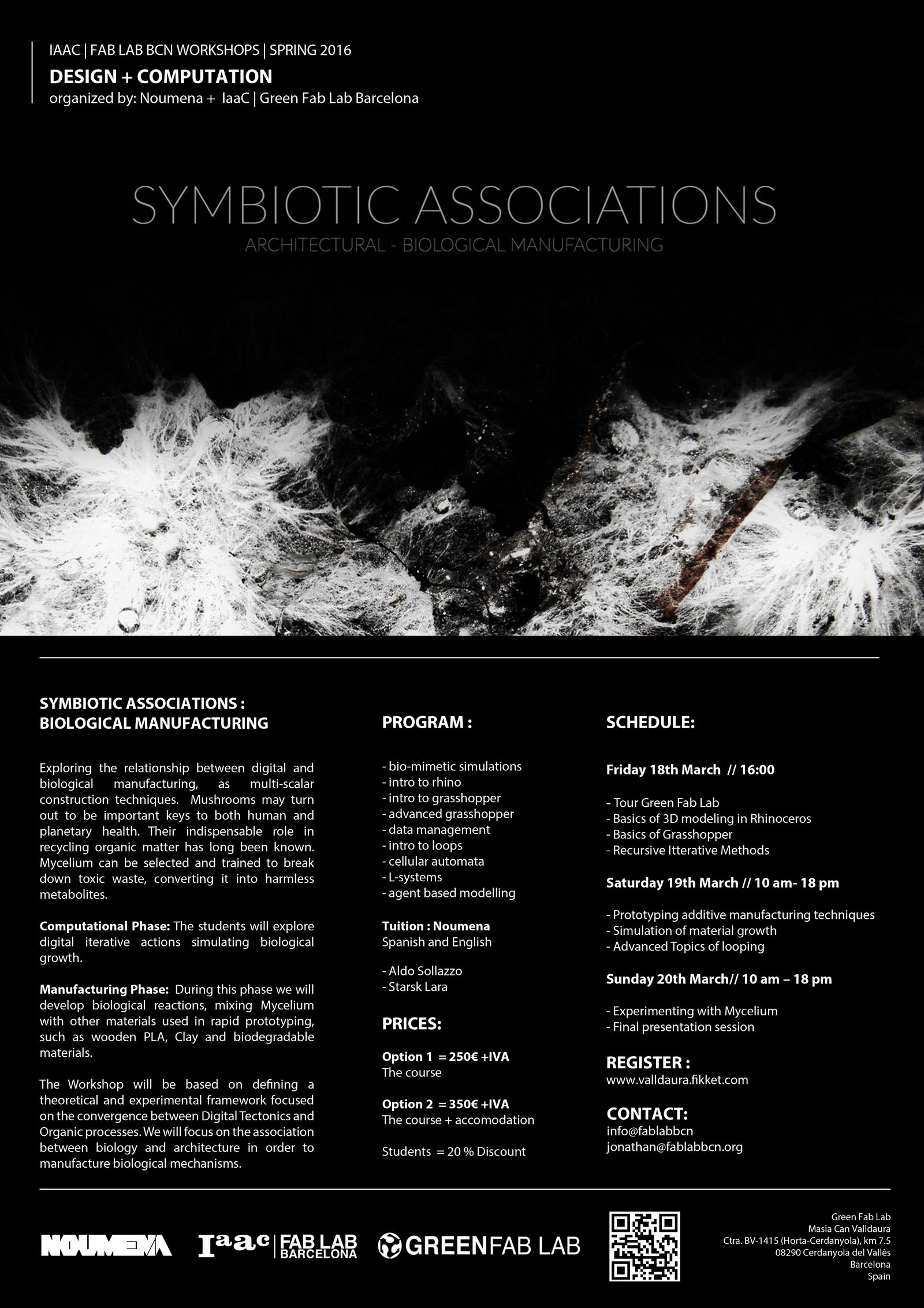Symbiotic Associations // March 2016
The purpose of the course is to explore the relationship between digital and biological manufacturing, as multi-scalar construction techniques. The Workshop will be based on defining a theoretical and experimental framework focused on the convergence between Digital Tectonics and Organic processes. We will focus on the association between biology and architecture in order to manufacture biological mechanisms.
CONTEXT
Humans are adept at inventing toxins yet equally inept at eliminating them from our environment. Due to current trends, our exposure to dangerous chemicals increases with time as our environment becomes more polluted.
Mushrooms may turn out to be important keys to both human and planetary health. Their indispensable role in recycling organic matter has long been known. Mycelium can be selected and trained to break down toxic waste, converting it into harmless metabolites. Mushroom allies may even be able to detoxify chemical warfare agents. The use of fungi to improve environment’s health by filtering water, in order to help trees to grow in forests and plants in gardens, is one facet of a larger strategy called Mycoremediation, acording to the mycologist Paul Stamets.
The broader meaning of Mycoremediation is the process which fungi degrades or removes toxins from the environment. Mycoremediation practices involve mixing mycelium with contaminated soil, by placing mycelial mats over toxic sites. The powerful enzymes secreted by specific fungi are able to digest lignin and cellulose, the primary structural components of wood. These digestive enzymes can also break down a surprisingly wide range of toxins that have similar chemical bonds with wood.

SYMBIOTIC ASSOCIATIONS
In this context, Noumena, Green Fab Lab and Fab Lab Barcelona present SYMBIOTIC ASSOCIATIONS workshop. The purpose of the course is to explore the relationship between digital and biological manufacturing. We will focus on the association between biology and architecture in order to manufacture biological mechanisms.
During the workshop, participants will be involved in a dynamic workflow, studying algorithms based on recursive systems associated with organic and digital manufacturing. The Workshop will be divided into two main phases:
-
Computational Phase: students will explore digital iterative actions simulating biological growth.
Manufacturing Phase: we will develop biological reactions, mixing Mycelium with other materials used in rapid prototyping, such as wooden PLA, Clay and biodegradable materials.
TOPICS
-
Intro to rhino
Intro to grasshopper
Advanced grasshopper
Data management
Intro to loops
Cellular automata
L-systems
Agent based modelling
Bio-mimetic simulations
TUTORS / LECTURERS
Aldo Sollazo, Ronald Postma and Mauro Jannone.
Organized by: Noumena + IaaC: Green Fab Lab & Fab Lab Barcelona
DATES
March 18th to 20th, 2016
SCHEDULE
Friday 18th // 10 am to 18pm
Tour at Green Fab Lab
Basics of 3D modeling in Rhinoceros
Basics of Grasshopper
Recursive iterative methods
Saturday 19th // 10 am- 18 pm
Advanced Topics of looping
Simulation of material growth
Prototyping with additive manufacturing techniques
Sunday 20th // 10 am – 18 pm
Experimenting with Mycelium
Final presentation session
PLACE
Ctra. BV-1415 (Horta-Cerdanyola), km 7
08290 Cerdanyola del Vallès
Barcelona - Spain
+34 617351890
FEE FOR PARTICIPANTS
Option 1 = 250€ + IVA
Basic - Transportation to the Green Fab Lab is included
Option 2 = 350€ + IVA
Premium - Accommodation and meals included at Valldaura
Students = 20 % Discount
REGISTRATION
You can book this workshop using the online registration form
For more information please e-mail at:
info@fablabbcn.org
jonathan@fablabbcn.org
